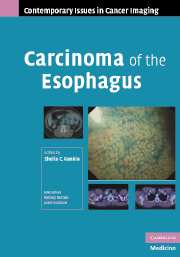Book contents
- Frontmatter
- Contents
- Contributors
- Series foreword
- Preface to Carcinoma of the Esophagus
- 1 Epidemiology and Clinical Presentation in Esophageal Cancer
- 2 Pathology of Esophageal Cancer
- 3 Recent Advances in the Endoscopic Diagnosis of Esophageal Cancer
- 4 Endoscopic Ultrasound in Esophageal Cancer
- 5 CT in Esophageal Cancer
- 6 FDG-PET and PET/CT in Esophageal Cancer
- 7 The Role of Surgery in the Management of Esophageal Cancer and Palliation of Inoperable Disease
- 8 Chemotherapy and Radiotherapy in Esophageal Cancer
- 9 Role of Stents in the Management of Esophageal Cancer
- 10 Lasers in Esophageal Cancer
- Index
- References
8 - Chemotherapy and Radiotherapy in Esophageal Cancer
Published online by Cambridge University Press: 08 August 2009
- Frontmatter
- Contents
- Contributors
- Series foreword
- Preface to Carcinoma of the Esophagus
- 1 Epidemiology and Clinical Presentation in Esophageal Cancer
- 2 Pathology of Esophageal Cancer
- 3 Recent Advances in the Endoscopic Diagnosis of Esophageal Cancer
- 4 Endoscopic Ultrasound in Esophageal Cancer
- 5 CT in Esophageal Cancer
- 6 FDG-PET and PET/CT in Esophageal Cancer
- 7 The Role of Surgery in the Management of Esophageal Cancer and Palliation of Inoperable Disease
- 8 Chemotherapy and Radiotherapy in Esophageal Cancer
- 9 Role of Stents in the Management of Esophageal Cancer
- 10 Lasers in Esophageal Cancer
- Index
- References
Summary
Introduction
Over 7600 cases of esophageal cancer are diagnosed in the United Kingdom every year. The overall survival is about 8%, and whilst there has been some improvement over time, this has not been dramatic and appears to date back to the mid 1980s (Figure 8.1). To improve these figures significantly will require prevention, earlier diagnosis, and more effective systemic therapies.
Development of chemotherapy
A UK multicenter trial, published in 1997, established epirubicin, cisplatin, and infusional 5-fluorouracil (5-FU; ECF) as the combination of choice in the UK and Europe. In this study 256 patients were randomly assigned to the then standard FAMTX regime (5-fluorouracil, doxorubicin, and methotrexate) or to ECF. About 51 patients had esophageal, 60 esophagogastric, and 145 gastric cancer. The overall response rate was 45% with ECF and 21% with FAMTX (p = 0.0002), the median survival was 8.9 versus 5.7 months with FAMTX and, at 1 year, 36 versus 21% of the patients were alive.
With improvements in chemotherapy supportive medication, for example, the introduction of HT-3 antagonists for anti-emetic cover, cisplatin-based chemotherapy has become the treatment of choice for the majority of patients requiring chemotherapy.
Recent developments in drug therapy have increased the options for trials of systemic therapy. None has yet been proven to improve on ECF in terms of efficacy, although recent trials have shown at least equivalent activity with reduced toxicity with some new agents.
- Type
- Chapter
- Information
- Carcinoma of the Esophagus , pp. 122 - 133Publisher: Cambridge University PressPrint publication year: 2007

